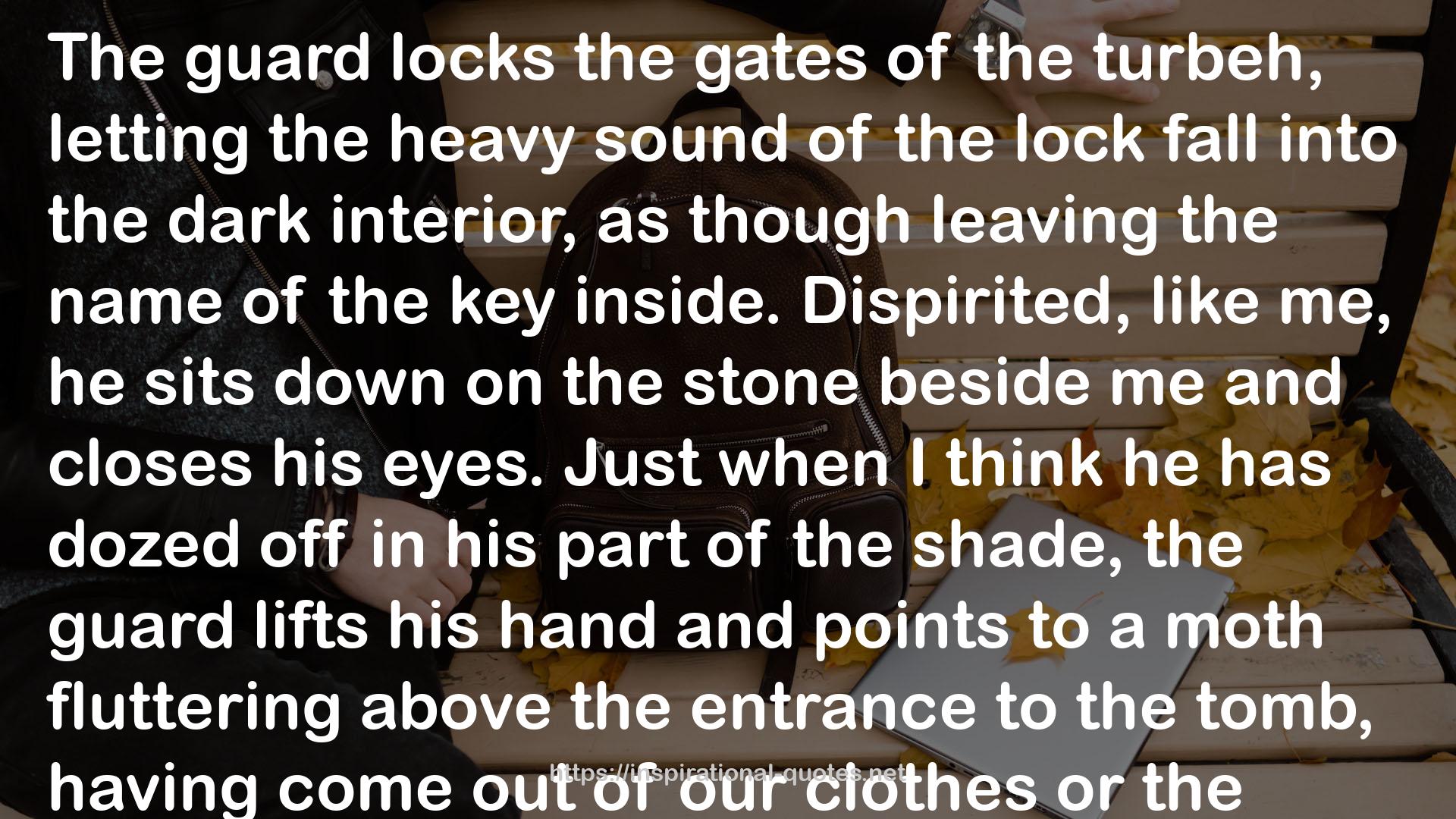" The guard locks the gates of the turbeh, letting the heavy sound of the lock fall into the dark interior, as though leaving the name of the key inside. Dispirited, like me, he sits down on the stone beside me and closes his eyes. Just when I think he has dozed off in his part of the shade, the guard lifts his hand and points to a moth fluttering above the entrance to the tomb, having come out of our clothes or the Persian carpets in the turbeh.
"You see," he says to me casually, "the moth is way up there by the white wall of the doorway, and it is visible only because it moves. From here it almost looks like a bird in the sky. That's probably how the moth sees the wall, and only we know it is wrong. But it doesn't know that we know. It doesn't even know we exist. You try to communicate with it if you can. Can you tell it anything in a way it understands; can you be sure it understood you completely?"
"I don't know," I replied. "Can You?"
"Yes," the old man said quietly, and with a clap of his hands he killed the moth, then profered its crushed body on the palm of his hand.
"Do you think it didn't understand what I told it?"
"You can do the same thing with a candle, extinguish it with your two fingers to prove you exist," I commented.
"Certainly, if a candle is capable of dying... Now, imagine," he went on, "that there is somebody who knows about us what we know about the moth. Somebody who knows how, with what, and why this space that we call the sky and assume to be boundless, is bounded-- somebody who cannot approach us to let us know that he exists except in one way-- by killing us. Somebody, on whose garments we are nourished, somebody who carries our death in his hand like a tongue, as a means of communicating with us. By killing us, this anonymous being informs us about himself. And we, through our deaths, which may be no more than a warning to some wayfarer sitting alongside the assassin, we, I say, can at the last moment perceive, as through an opened door, new fields and other boundaries. This sixth and highest degree of deathly fear (where there is no memory) is what holds and links us anonymous participants in the game. The hierarchy of death is, in fact, the only thing that makes possible a system of contacts between the various levels of reality in an otherwise vast space where deaths endlessly repeat themselves like echoes within echoes... "
Image for Quotes
 "I don't know," I replied. "Can You?"
"I don't know," I replied. "Can You?""Yes," the old man said quietly, and with a clap of his hands he killed the moth, then profered its crushed body on the palm of his hand.
"Do you think it didn't understand what I told it?"
"You can do the same thing with a candle, extinguish it with your two fingers to prove you exist," I commented.
"Certainly, if a candle is capable of dying... Now, imagine," he went on, "that there is somebody who knows about us what we know about the moth. Somebody who knows how, with what, and why this space that we call the sky and assume to be boundless, is bounded-- somebody who cannot approach us to let us know that he exists except in one way-- by killing us. Somebody, on whose garments we are nourished, somebody who carries our death in his hand like a tongue, as a means of communicating with us. By killing us, this anonymous being informs us about himself. And we, through our deaths, which may be no more than a warning to some wayfarer sitting alongside the assassin, we, I say, can at the last moment perceive, as through an opened door, new fields and other boundaries. This sixth and highest degree of deathly fear (where there is no memory) is what holds and links us anonymous participants in the game. The hierarchy of death is, in fact, the only thing that makes possible a system of contacts between the various levels of reality in an otherwise vast space where deaths endlessly repeat themselves like echoes within echoes..." style="width:100%;margin:20px 0;"/>